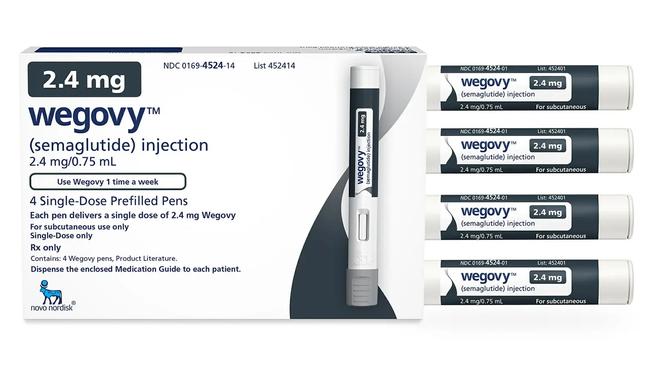Weight loss drug Wegovy cuts heart attack risk
A weight loss drug that not only treats obesity has now been shown to save lives, slashing the risk of heart attacks.
Health
Don't miss out on the headlines from Health. Followed categories will be added to My News.
Weight loss drug Wegovy has been found to slash heart attacks and strokes by 20 per cent in a large-scale trial that could help speed up its approval for subsidy in Australia.
The UK’s health minister has hailed the clinical trial results and claimed the drug could help ease pressure on that country’s National Health Service and reduce waiting times for treatment.
And Australian obesity expert Professor John Dixon has described the clinical trial results as an “absolutely seminal event”.
“This study has changed everything,” said the researcher from the Iverson Health Innovation research Institute and Swinburne University.
“This is showing us that these drugs do save lives,” he said.

Heart Foundation chief medical adviser Gary Jennings said the study results were “very exciting”.
“The top line results have not been seen before with anything with any other medical treatment,” he said.
Pharmaceutical company Novo Nordisk issued a press release heralding the clinical trial results overnight but the study of 17,000 people over a five-year period has yet to be peer reviewed or published in a medical journal.
It showed a 20 per cent reduction in major adverse cardiovascular events (MACEs) in people who were overweight or obese who had established cardiovascular disease.
“People living with obesity have an increased risk of cardiovascular disease but to date, there are no approved weight management medications proven to deliver effective weight management while also reducing the risk of heart attack, stroke or cardiovascular death. Therefore, we are very excited about the results from SELECT showing that semaglutide 2.4 mg reduces the risk of cardiovascular events,” said Martin Holst Lange, executive vice president for Development at Novo Nordisk.
“SELECT is a landmark trial and has demonstrated that semaglutide 2.4 mg has the potential to change how obesity is regarded and treated,” Mr Holst Lange said.

There are more than 57,000 heart attacks in Australia every year and over 39,500 strokes and together the conditions take the lives of 25,000 Australians each year.
While not all these events are related to obesity a medication that could make a dent in this would significantly reduce the strain on the health system.
The $400 per month injectable medication Wegovy has already been shown to produce a 15 per cent reduction in weight in people using it and was approved for this purpose in the US in January.
Wegovy has been approved for use in weight loss in Australia, however the medication is not currently available here as the pharmaceutical company struggles to keep up with demand worldwide.
A lower dose form of the drug -diabetes medication Ozempic – was being used off label by doctors to treat obesity in Australia causing a major shortage.
It has recently been restricted for use in diabetes to stop patients with this condition having to compete for access with those using it for weight loss.
An independent expert advisory committee the Pharmaceutical Benefits Advisory Committee will decide whether to approve a government subsidy for Wegovy in November.

Professor Dixon who was involved in earlier clinical trials of the medication said people with obesity had never had an effective treatment and there had never been a drug on the PBS to treat obesity.
“Not only is it a stigmatising disease, it’s dangerous for your current health, your quality of life, but it shortens your life,” Professor Dixon said.
The trials showing the drug could reduce heart attacks and strokes could help it gain PBAC approval, he said.
Wegovy mimics a gut hormone called glucagon-like peptide 1 (or GLP-1) and works by suppressing appetite and slowing down the progression of food through the gut.
Eight in ten people using it are likely to suffer gut related side effects that include nausea, vomiting, diarrhoea, or constipation for a few weeks or months after starting the treatment, Professor Dixon said.
It is expected the drug will have to be used lifelong to maintain the weight loss.
There are a range of other new weight loss drugs like Wegovy in the pipeline.
Pharmaceutical giant Eli Lilly is working on a medicine called Mounjaro which combines two gut hormones to control appetite and produce weight loss.
Clinical trials showed it produced a 21 per cent loss in body weight in people who took the highest dose for 18 months.
It has a second drug retatrutide, which mimics three appetite suppressing hormones that is in clinical trials.
More Coverage
Originally published as Weight loss drug Wegovy cuts heart attack risk





